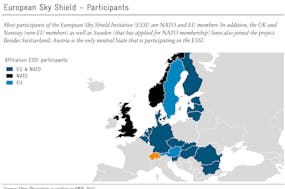The coronavirus pandemic, which has now afflicted every continent, has drastic consequences for Switzerland’s society and economy too. That has compelled the Federal Council to declare an “extraordinary situation,” despite the fact that the measures imposed severely interfere with fundamental rights to economic freedom.
The government’s solutions have addressed the main economic problems: liquidity shortfalls for companies and the loss of earnings due to short-time working. The CHF 42 billion emergency aid provided by the government will help to reduce the negative economic impact of the corona disease in the coming months. Although the amount is remarkably high, it is economically justifiable: the Federal Council has, quite rightly, chosen to forego stimulus packages as their impact would have no lasting effect.
The innovative capacity of Swiss companies and the adaptability of employees and consumers have already proved exceptional during this crisis. They have demonstrated flexibility and are shifting to online ordering and selling and, whenever possible, working from home. In logistics, new digital distribution channels have been designed in no time at all. A clear majority of society, including politicians and businesses, has dealt with the corona threat calmly and deliberately. However, some left-wing parties are trying to take advantage of this crisis to implement changes to Switzerland’s liberal system.
That has prompted the rise of self styled “experts” proposing seemingly “perfect” solutions: the unions are pushing for an economic stimulus program; the Social Democrats are calling for the ecological reconstruction of the economy, costing billions; the Green Party is demanding re-nationalization; while some academics are calling for a CHF 100 billion program without even knowing where the money could be spent.

Many present questionable ideas, trying to take advandage of the corona pandemic. (jodylehigh, Pixabay)
Strikingly, many of those advocating an economic stimulus program, are ignoring the current health status of the population. Consumption should now be restricted, rather than stimulated, to help tackle the spread of the virus. Although this pandemic has led to a global health crisis, it is not a crisis of globalization. This speaks against the strategy of re-nationalization.
The crisis is likely to last several months and will result in further economic disruptions at international level. But it is an exceptional and temporary situation. Globalisation has been key to increased wellbeing over recent decades and will continue to be so in future. It would be grossly negligent – or outright duplicitous – to challenge and obstruct the successful integration of Swiss firms in the global economy. Demanding re-nationalization is anything but the right strategy for combating this crisis. Rather, overcoming this pandemic requires increased international collaboration to close supply gaps and develop appropriate vaccines and medication.
This article was published in "Handelszeitung" on March 26.





